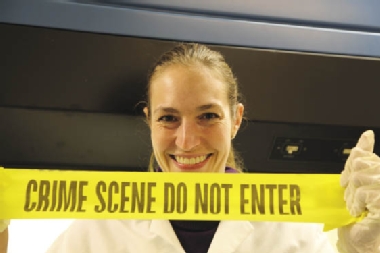Campus News
Forensic anthropologist Lauren Zephro is a voice for victims of crime
The girl’s decomposed body was found in 1994 in the shadowed woods of Pogonip, not far from downtown Santa Cruz. She was petite, with short-cropped dark hair and a small heart tattooed on her hand. She had been brutally beaten. At the time, police estimated the girl to be in her 20s but had little […]

The girl’s decomposed body was found in 1994 in the shadowed woods of Pogonip, not far from downtown Santa Cruz. She was petite, with short-cropped dark hair and a small heart tattooed on her hand. She had been brutally beaten.
At the time, police estimated the girl to be in her 20s but had little else to go on, and her murder soon drifted onto the cold case list.
Sixteen years later, enter Lauren Zephro, a tall, athletic forensic anthropologist. To Zephro (Cowell ‘93, anthropology), bones whisper and fingerprints talk.
Using new technology, including a cementum test of the girl’s teeth and isotopic hair analysis, Zephro discovered the girl was actually 14 to 18 years old and that, before her death, she likely traveled the coast between Santa Barbara and Santa Cruz. Zephro’s findings not only helped bring in new clues but also shifted the direction of the case, which is still under investigation.
“The girl was connected to someone, connected to the world,” said Zephro, sitting behind a metal, government-issued desk at the Santa Cruz County Sheriff’s Office forensics lab, where she now works. “I am confident, somewhere along the line, she will be identified.”
It was a forensic anthropology course taught by UCSC Professor Alison Galloway (who was named campus provost/executive vice chancellor in 2010) that brought Zephro to this spot.
“I had never felt so alive as I did in that class,” Zephro said. “It was the moment in my academic career that set me on the path of everything I have done since.”
She went on to get her masters in anthropology from the University of Tennessee, Knoxville, and, with the help of a UC Regents Fellowship, is now a doctoral candidate in physical anthropology at UCSC. Meanwhile, she is working full-time for the Sheriff’s Office, a job that is sometimes dirty, often exhausting, and frequently painstaking. On any given day, Zephro may be lifting latent fingerprints from a firearm, climbing steep terrain in search of scattered bones, writing a detailed analysis of her findings, or testifying in court.
“She’s a super hard worker,” said Sgt. Alan Burt, who heads the sheriff’s coroner division. “She’ll go on scenes and be digging in the dirt and then she gives these tremendous reports…. It’s nice to have that brain power on your side.”
Zephro’s work with fingerprints helped discover the killer of a Capitola man 32 years after the fact and send a murderer to prison for a Monterey County death. In that case, she combed through yards of tape that had been wrapped around a decaying body—a job so smelly it drove nearby deputies out of their offices—until she found a single fingerprint connected to a suspect.
“Lauren has a questioning mind that keeps theoretical principles in mind but also questions those principles,” said Galloway, who is Zephro’s doctoral advisor and still works with her on cases. “She is meticulous and thoughtful in her work.”
For Zephro, Galloway was an inspiration and UCSC “a place that allowed me to reach my full potential; to tell me I had potential.”
And, someday, she promised, the girl known only as “Pogonip Jane” will be identified. Then, Zephro said, “she is coming home to all of us who wonder who she is.”
Peggy Townsend is a freelance writer based in Santa Cruz.